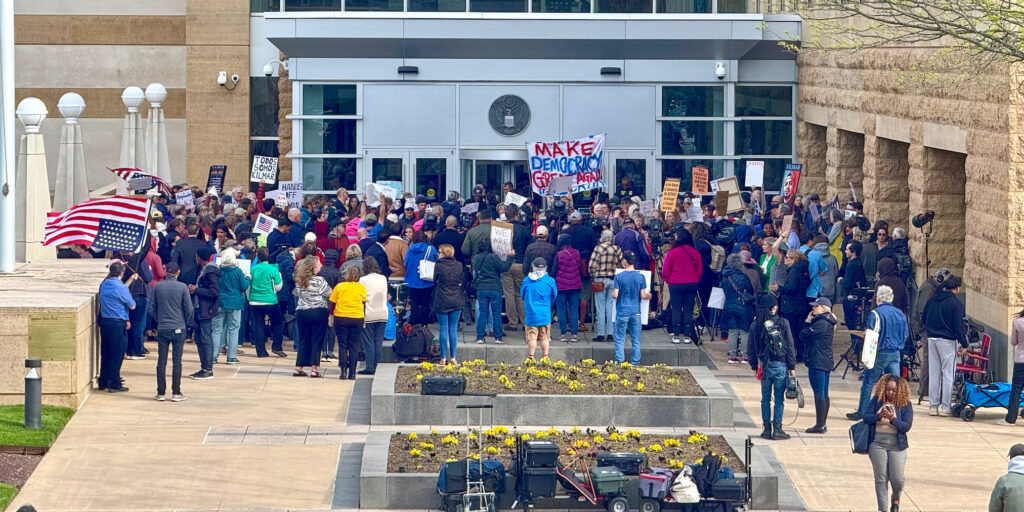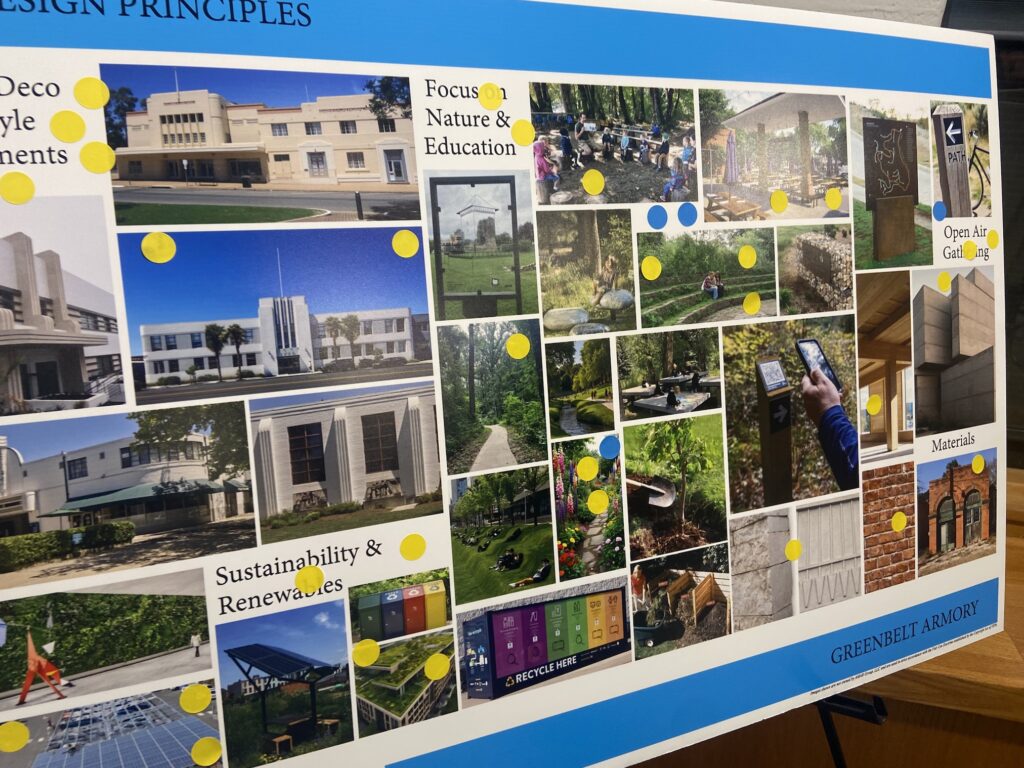Apparently the public is waiting until after the various worksessions before weighing in on the Fiscal Year (FY) 2025 budget, as no one offered input at the public hearing portion of council’s Monday, April 22, meeting. Mayor Emmett Jordan noted that the full budget is available online (greenbeltmd.gov/government/city-administration/finance/city-budget) and that adoption of the budget is scheduled for June 3, following a second public hearing on May 29.
City Manager Josué Salmerón noted a few highlights. The American Rescue Plan Act (ARPA) position is now part of the operational budget. The deficit is now closed, at the expense of some activities and cost reductions. The proposed budget includes a 2 percent cost of living adjustment for employees, along with a 3 percent merit increase, moves considered vital to attracting and retaining qualified staff. He noted that the recent closing of Chevy’s restaurant and the T.J. Maxx store at Beltway Plaza raises concerns about the city’s property tax income.
JEDI Audit
Tyra Smith, the city’s Diversity, Equity, Inclusion (DEI) officer, presented recommendations based on the finding of the recent Justice, Equity, Diversity and Inclusion (JEDI) audit report, conducted by Tribesy. That report had found that staff morale was the biggest issue, affected by employee perception of departmental silos and stifled initiative. The final report can be viewed at greenbeltmd.gov/government/diversity-equity-and-inclusion.
Smith proposed two approaches to address the elements of an unhealthy environment that the JEDI audit identified. The top-down approach will involve senior management and supervisors in reviewing policies through a JEDI lens to improve systemic accountability on DEI issues through all departments. The bottom-up approach will involve establishing DEI leads from all departments on a JEDI Action Team. This team will drive programs and employee engagement opportunities across departments.
The recommendations involve a learning journey for all staff to achieve Greenbelt’s DEI goals: defining a clear mission, breaking the “silos” that inhibit collaboration between departments, establishing ways to recognize the work employees do, encouraging and supporting employees in bringing forward new ideas, and bringing employees together more often for fun and learning.
Smith outlined the structure of the JEDI Action team, which will have three subcommittees: employee engagement and recognition, strategic planning, and awareness and education. All leadership and supervisory staff will commit to training in emotional intelligence, effective dialogue, conflict management, Connecting Your DEI Why and inclusive leadership.
An action team meeting was scheduled for the next day.
Councilmember Kristin Weaver noted that the action team has 13 members, with all departments represented. She said she had been disheartened by the results of the Tribesy audit, but that it was important for issues to come to light and be addressed, and not be buried.
The Tribesy audit had found a number of JEDI cultural threats affecting employees, including a cohort of white veteran employees who control access to institutional knowledge, inhibit change and frustrate and harm employees who attempt new things. It found many characteristics of a culture rooted in white default, such as defensiveness, “one right way” thinking, power hoarding, conflict among directors that contributes to departmental “silos” and outdated systems impacting employee workloads. See pages 44-46 of the April 22 meeting agenda packet, available by clicking the Municipal Access TV button on greenbeltmd.gov.
Councilmember Jenni Pompi appreciated the plan’s employee-centered approach and its goal of “making the city an inclusive space where people want to work.” Councilmember Danielle McKinney noted the forward thinkingness of the learning journey for all staff, who would develop soft skills, especially leadership skills. She saw the plan as a way to help city staff to support the community in the best way possible.
Pushback from Citizens
In an email read by Jordan, resident Michael Hartman found it sadly ironic that the DEI action plan discussion starts on Passover, a major religious holiday. He also wanted the action team to ensure that the inclusivity extended to people with disabilities.
J Davis of Greenbelt East stated that a positive strategy had been presented at the meeting, but she characterized comments on social media about the DEI audit as “not productive, negative and destructive.” She felt the public didn’t understand the goal of the audit and that some of the terms, such as “white bubble” and “white default” were causing pushback.
Councilmember Amy Knesel acknowledged the upsetting terminology, but opined that “feeling uncomfortable is where learning starts.” Resident Lois Rosado had found it a difficult report to read but commended the efforts of the action team. She noted that an explanation of the terms was essential and that they were “going to make people uncomfortable.”
Other members of the public shared the discomfort, but were not apparently willing to start learning.
Resident Justin Baker said that use of the terms such as “normalization of whiteness” and “white default” showed that the audit “is a racist agenda, as is the DEI program.” Resident Bob Rudd supported Baker’s view. He asserted that “all races, creeds and colors have been involved and welcomed in Greenbelt since its founding” and he “feels disrespected” that anyone would suggest otherwise. “The people who object don’t need to be educated,” he maintained.
(In fact, according to Greenbelt: History of a New Town, 1937-1987, when the first Greenbeltians were selected, “Blacks, however, were excluded.”)
Update on Shooting
Police Chief Richard Bowers provided additional details about the shootings that occurred on April 19 at Schrom Hills Park on Senior Skip Day. The gathering in Schrom Hills Park occurred after the crowd of hundreds of teenagers had been dispersed by Bowie Police from their original gathering place. Greenbelt Police, among others, responded to reports of disorderly conduct, noise and parking clogging Hanover Parkway. They found a large crowd that was generally behaving, with squirt guns and water fights in evidence before the shooting. As a coordination meeting between the various forces was breaking up, officers heard gunfire and ran in the direction of the shots. They provided vital emergency first aid, as the fire department’s EMTs were delayed for nearly 20 minutes due to the traffic on Hanover Parkway by people fleeing the event.
Councilmembers and residents deplored the event and commended the first responders. Various questions were asked, but few were amenable to satisfactory answers.
Could the police have had more warning, perhaps through the schools? Unlikely. Although the schools no doubt recognized it was Senior Skip Day when taking attendance in first period, the gathering sites shifted frequently, with the new locations disseminated in real time on social media outlets adults tend not to use.
Can the city, perhaps through its faith community, provide trauma counseling to the students who witnessed the shootings? Jordan explained that such action is probably best left to the many schools from which the students came, as the city does not have names of the participants.
And the overarching, overwhelming, intractable question: How do kids that age have guns?
Maglev Update
Susan McCutcheon of the Maryland Coalition for Responsible Transit (MCRT) gave an update on the proposed Northeast Maglev project from D.C. to Baltimore. She noted that the company has withdrawn its application for water quality certification from the Maryland Department of the Environment, without which the project cannot proceed, but is nevertheless reaching out to the minority- and women-owned business communities in Baltimore, as if they’re going full-speed ahead. MCRT is working to counter their advances by providing information on the roadblocks the project is hitting. She also thinks that, with the Key Bridge collapse and need to rebuild it, Maryland transportation funds are unlikely to go to the maglev project.
J Davis, a member of the MCRT strategizing group, agreed that the maglev people are still trying to drum up support and that the opponents need to maintain pressure.
Lois Rosado, participating online, noted that maglev supporters are circulating petitions on Instagram that need to be countered.
(See upcoming story for more information on the status of the maglev and visit MCRT-Action.org for updates on the main page and further actions on the opposition tab.)
Concurrent Board Membership
Council adopted, after some debate, a measure that would allow individuals who serve on the Board of Appeals, Employee Relations Board or Ethics Commission to also serve on one other of the city’s advisory boards and commissions. The reason for the resolution, said Jordan, was the difficulty in recruiting enough people to serve on the boards. Currently individuals can serve on only one board and there are numerous vacancies that have not been filled.
Davis was worried that the measure would encourage a lack of diversity on the advisory bodies. Councilmember Rodney Roberts opposed, saying that the measure will not solve the problem of a lack of volunteers, but rather sets up special rules for a small group of people. He was concerned that the measure created a structure that lacked DEI. Resident Bill Orleans argued that it was better to have vacancies on committees than to have council able to appoint someone to more than one. Why, he asked, in a city of 25,000 people can’t we find 100 people who want to participate in the affairs of our city?
Jordan rejoined that, “Some people roll up their sleeves, some just have opinions.”
The measure passed 4-2, with Roberts and McKinney opposed. (Difficulty engaging residents in community service was also raised at the recent council worksession with HOAs. See page 13.)
Other Actions
Council also unanimously approved a sole-source contract with CMG Flooring to install a new floor in Room 12 of the Community Center to convert it into an annex for the dance studio. The flooring is specific for dancing and is designed to accommodate all types of dance classes, including ballet, jazz, tap and barefoot.
A resolution to purchase 22 acres of land between Greenbelt Station and the Greenbelt Metro Station at slightly below market value for $196,000 was given its first reading. The property has significant environmental features, including streams, wetlands and woodlands. The city currently holds an easement to construct and maintain a trail to the Metro station, but staff believe that purchase will give the city control of all future use of the property, including the trail.
Following the public portion of the meeting, council went into closed session to discuss public security.




